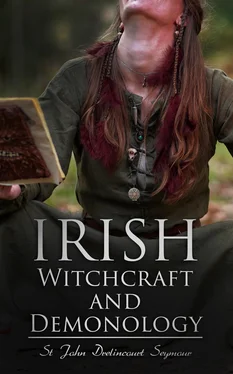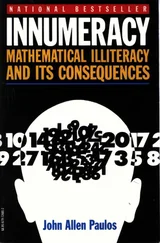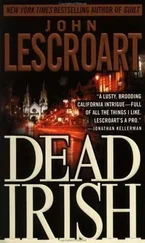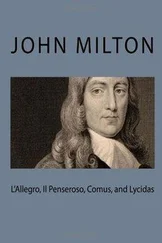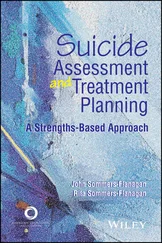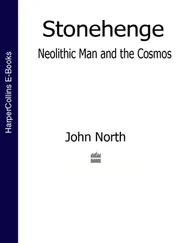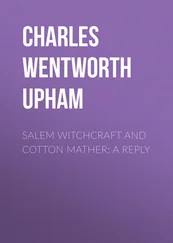St John Drelincourt Seymour - Irish Witchcraft and Demonology
Здесь есть возможность читать онлайн «St John Drelincourt Seymour - Irish Witchcraft and Demonology» — ознакомительный отрывок электронной книги совершенно бесплатно, а после прочтения отрывка купить полную версию. В некоторых случаях можно слушать аудио, скачать через торрент в формате fb2 и присутствует краткое содержание. Жанр: unrecognised, на английском языке. Описание произведения, (предисловие) а так же отзывы посетителей доступны на портале библиотеки ЛибКат.
- Название:Irish Witchcraft and Demonology
- Автор:
- Жанр:
- Год:неизвестен
- ISBN:нет данных
- Рейтинг книги:4 / 5. Голосов: 1
-
Избранное:Добавить в избранное
- Отзывы:
-
Ваша оценка:
- 80
- 1
- 2
- 3
- 4
- 5
Irish Witchcraft and Demonology: краткое содержание, описание и аннотация
Предлагаем к чтению аннотацию, описание, краткое содержание или предисловие (зависит от того, что написал сам автор книги «Irish Witchcraft and Demonology»). Если вы не нашли необходимую информацию о книге — напишите в комментариях, мы постараемся отыскать её.
Irish Witchcraft and Demonology — читать онлайн ознакомительный отрывок
Ниже представлен текст книги, разбитый по страницам. Система сохранения места последней прочитанной страницы, позволяет с удобством читать онлайн бесплатно книгу «Irish Witchcraft and Demonology», без необходимости каждый раз заново искать на чём Вы остановились. Поставьте закладку, и сможете в любой момент перейти на страницу, на которой закончили чтение.
Интервал:
Закладка:
Another point arises in connection with the advance of the Reformation in Ireland. Unfortunately the persecution of witches did not cease in the countries where that movement made headway—far from it; on the contrary it was kept up with unabated vigour. Infallibility was transferred from the Church to the Bible; the Roman Catholic persecuted the witch because Supreme Pontiffs had stigmatised her as a heretic and an associate of Satan, while the Protestant acted similarly because Holy Writ contained the grim command “Thou shalt not suffer a witch to live.” Thus persecution flourished equally in Protestant and Roman Catholic kingdoms. But in Ireland the conditions were different. We find there a Roman Catholic majority, not racially predisposed towards such a belief, debarred by their religious and political opinions from taking their full share in public affairs, and opposed in every way to the Protestant minority. The consequent turmoil and clash of war gave no opportunity for the witchcraft idea to come to maturity and cast its seeds broadcast; it was trampled into the earth by the feet of the combatants, and, though the minority believed firmly in witchcraft and kindred subjects, it had not sufficient strength to make the belief general throughout the country.
A third reason that may be brought forward to account for the comparative immunity of Ireland was the total absence of literature on the subject. The diffusion of books and pamphlets throughout a country or district is one of the recognised ways of propagating any particular creed; the friends and opponents of Christianity have equally recognised the truth of this, and have always utilised it to the fullest extent. Now in England from the sixteenth century we find an enormous literary output relative to witchcraft, the majority of the works being in support of that belief. Many of these were small pamphlets, which served as the “yellow press” of the day; they were well calculated to arouse the superstitious feelings of their readers, as they were written from a sensational standpoint—indeed it seems very probable that the compilers, in their desire to produce a startling catch-penny which would be sure to have a wide circulation, occasionally drew upon their imaginations for their facts. The evil that was wrought by such amongst an ignorant and superstitious people can well be imagined; unbelievers would be converted, while the credulous would be rendered more secure in their credulity.
At a later date, when men had become practical enough to question the reality of such things, a literary war took place, and in this “battle of the books” we find such well-known names as Richard Baxter, John Locke, Meric Casaubon, Joseph Glanvil, and Francis Hutchinson, ranged on one side or the other. Thus the ordinary Englishman would have no reasonable grounds for being ignorant of the power of witches, or of the various opinions held relative to them. In Ireland, on the other hand (with the solitary exception of a pamphlet of 1699, which may or may not have been locally printed), there is not the slightest trace of any witchcraft literature being published in the country until we reach the opening years of the nineteenth century. All our information therefore with respect to Ireland comes from incidental notices in books and from sources across the water. We might with reason expect that the important trial of Florence Newton at Youghal in 1661, concerning the historical reality of which there can be no possible doubt, would be immortalised by Irish writers and publishers, but as a matter of fact it is only preserved for us in two London printed books. There is no confusion between cause and effect; books on witchcraft would, naturally, be the result of witch-trials, but in their turn they would be the means of spreading the idea and of introducing it to the notice of people who otherwise might never have shown the least interest in the matter. Thus the absence of this form of literature in Ireland seriously hindered the advance of the belief in (and consequent practice of) witchcraft.
When did witchcraft make its appearance in Ireland, and what was its progress therein? It seems probable that this belief, together with certain aspects of fairy lore hitherto unknown to the Irish, and ideas relative to milk and butter magic, may in the main be counted as results of the Anglo-Norman invasion, though it is possible that an earlier instalment of these came in with the Scandinavians. With our present knowledge we cannot trace its active existence in Ireland further back than the Kyteler case of 1324; and this, though it was almost certainly the first occasion on which the evil made itself apparent to the general public, yet seems to have been only the culmination of events that had been quietly and unobtrusively happening for some little time previously. The language used by the Parliament with reference to the case of 1447 would lead us to infer that nothing remarkable or worthy of note in the way of witchcraft or sorcery had occurred in the country during the intervening century and a quarter. For another hundred years nothing is recorded, while the second half of the sixteenth century furnishes us with two cases and a suggestion of several others.
It is stated by some writers (on the authority, we believe, of an early editor of Hudibras ) that during the rule of the Commonwealth Parliament thirty thousand witches were put to death in England. Others, possessing a little common sense, place the number at three thousand, but even this is far too high. Yet it seems to be beyond all doubt that more witches were sent to the gallows at that particular period than at any other in English history. Ireland seems to have escaped scot-free—at least we have not been able to find any instances recorded of witch trials at that time. Probably the terribly disturbed state of the country, the tremendous upheaval of the Cromwellian confiscations, and the various difficulties and dangers experienced by the new settlers would largely account for this immunity.
Dr. Notestein1 shows that the tales of apparitions and devils, of knockings and strange noises, with which English popular literature of the period is filled, are indications of a very overwrought public mind; of similar stories in Ireland, also indicative of a similar state of tension, some examples are given in chapter IV. Though the first half of the seventeenth century is so barren with respect to witchcraft , yet it should be noticed that during that period we come across frequent notices of ghosts, apparitions, devils, &c., which forces us to the conclusion that the increase of the belief in such subjects at that time was almost entirely due to the advent of the Cromwellian settlers and the Scotch colonists in Ulster; indeed the beliefs of the latter made the Northern Province a miniature Scotland in this respect. We cannot blame them for this; could anything else be expected from men who, clergy and laity alike, were saturated with the superstitions that were then so prominent in the two countries from which their ranks had been recruited?
Thus the seventeenth century was the period par excellence of witchcraft, demonology, and the supernatural in Ireland. The most remarkable witch case of that time, the trial of Florence Newton in 1661, to which allusion has already been made, seems to have been largely influenced by what occurred in England, while the various methods suggested or employed as a test of that old woman’s culpability are quite in accordance with the procedure adopted a few years previously by the English witch-finder general, the infamous Matthew Hopkins. After 1711 the period of decadence is reached, while between that date and 1808 nothing has been found, though it may be safely inferred that that blank was filled by incidents similar to the case of Mary Butters and others, as described in the final chapter; and possibly too, as in England, by savage outbursts on the part of the ignorant and credulous multitude.
Читать дальшеИнтервал:
Закладка:
Похожие книги на «Irish Witchcraft and Demonology»
Представляем Вашему вниманию похожие книги на «Irish Witchcraft and Demonology» списком для выбора. Мы отобрали схожую по названию и смыслу литературу в надежде предоставить читателям больше вариантов отыскать новые, интересные, ещё непрочитанные произведения.
Обсуждение, отзывы о книге «Irish Witchcraft and Demonology» и просто собственные мнения читателей. Оставьте ваши комментарии, напишите, что Вы думаете о произведении, его смысле или главных героях. Укажите что конкретно понравилось, а что нет, и почему Вы так считаете.
